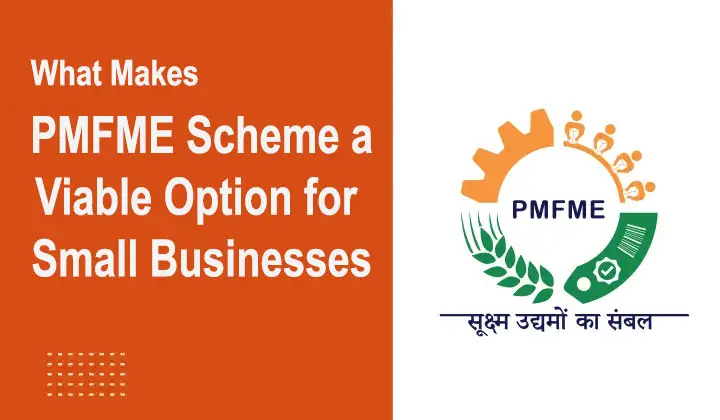Small businesses play a crucial role in fostering economic development and creating job opportunities in a rapidly growing economy like India. However, access to finance and other resources often poses a significant challenge for these businesses. To address this, the Indian government has introduced several schemes to support small enterprises, one of the most promising being the PMFME scheme.
This article explores the key features, benefits, and reasons why the PMFME scheme is a viable option for small businesses.
Understanding the PMFME Scheme
The PMFME scheme stands for the Pradhan Mantri Formalisation of Micro Food Processing Enterprises Scheme. Launched in June 2020, this scheme is part of the larger Atmanirbhar Bharat Abhiyan, aimed at supporting micro-food processing units in India. The govt scheme for business seeks to provide financial, technical, and business support to micro food processing enterprises, helping them formalise their operations, improve product quality, and expand their market reach.
Key Objectives of the PMFME Scheme
Here are the key objectives of the PMFME Scheme that small business owners should be aware of.
- Formalisation: Encourage unregistered food processing units to formalise their operations by registering under the appropriate legal framework.
- Capacity Building: Enhance the technical skills and capabilities of entrepreneurs through training and access to modern technology.
- Financial Support: Provide financial assistance in the form of grants, subsidies, and credit-linked capital for upgrading existing units and setting up new ones.
- Market Access: Improve market linkages for small food processing enterprises by promoting their products in domestic and international markets.
Key Features of the PMFME Scheme
The PMFME scheme offers a comprehensive package of support tailored to the needs of small food processing enterprises. Below are some of the key features that make this scheme a viable option for small businesses:
- One District One Product (ODOP) Approach:
The scheme adopts the ODOP approach, where each district is encouraged to focus on a specific food product that has a competitive advantage. This allows micro enterprises to leverage local resources, traditional skills, and unique products to create niche markets and boost their income.
- Financial Support:
Under the PMFME scheme, qualifying micro food processing units can obtain a credit-linked subsidy covering up to 35% of the project cost, with a cap of ₹10 lakh per unit. This subsidy can be used for various purposes, including technology upgradation, capacity expansion, and working capital.
- Skill Development and Capacity Building:
The scheme provides comprehensive training programs for entrepreneurs and workers, focusing on food safety, quality control, packaging, marketing, and other essential skills. This capacity-building initiative is crucial for improving the competitiveness and sustainability of small businesses.
- Common Infrastructure Development:
The govt scheme for business also supports the development of common infrastructure, such as food testing laboratories, warehouses, cold storage facilities, and packaging centres. These shared resources help small enterprises reduce operational costs and improve product quality.
- Support for Branding and Marketing:
The PMFME scheme assists micro-food processing enterprises in branding, marketing, and promoting their products through e-commerce platforms, trade fairs, and other channels. This support is essential for small businesses looking to expand their market reach and build a strong brand identity.
Eligibility and Application Process
Understanding the eligibility criteria and application process is crucial for small businesses interested in availing the benefits of the PMFME scheme. This scheme is specifically designed to support micro food processing units, and the eligibility requirements are tailored to ensure that the assistance reaches those who need it most.
- The PMFME scheme is open to existing unregistered micro food processing units.
- Individual entrepreneurs, start-up businesses, self-help groups, producer cooperatives, and farmer-producer organisations can apply.
- The enterprise must be full involved or engaged in food processing activities and should operate at a micro-scale.
Application Process
- Online Application: Entrepreneurs can apply for the scheme through the official PMFME portal or the MSME website.
- Document Submission: Applicants must submit necessary documents, including project reports, proof of identity, business registration, and other relevant certificates.
- Approval Process: After document verification and project appraisal, eligible enterprises receive approval and funds disbursement.
Advantages of the PMFME Scheme for Small Businesses
The PMFME scheme offers several advantages that make it an attractive option for small businesses:
- Accessibility to Finance:
The scheme provides much-needed financial assistance to micro food processing units, enabling them to upgrade their technology, expand capacity, and improve product quality without the burden of high-interest loans.
- Focus on Traditional and Local Products:
By promoting the ODOP approach, the scheme encourages the development and commercialisation of traditional and local food products, which can create a unique value proposition for small businesses.
- Comprehensive Support System:
The scheme offers a holistic support system that includes financial aid, skill development, infrastructure support, and marketing assistance, making it easier for small businesses to thrive in a competitive market.
- Encourages Formalisation:
The govt scheme for business incentivises unregistered micro units to formalise their operations, which can lead to better access to government benefits, improved creditworthiness, and enhanced business credibility.
How Banks Can Assist in Leveraging the PMFME Scheme?
While the PMFME scheme provides substantial support to small businesses, understanding the complexities of the application process and financial management can be challenging. This is where HDFC Bank can play a pivotal role. With its comprehensive range of financial products and services, HDFC Bank offers tailored solutions to help entrepreneurs make the most of the PMFME scheme. Whether it’s providing working capital loans, assisting with project report preparation, or offering advisory services, HDFC Bank ensures that small businesses have the financial backing they need to grow and succeed.
The PMFME scheme is a viable and attractive option for small businesses in India, offering a wide range of benefits that can significantly boost their growth and sustainability. By understanding the scheme’s features and leveraging the support from financial institutions like HDFC Bank, small businesses can unlock new opportunities and contribute to India’s vibrant entrepreneurial market.

